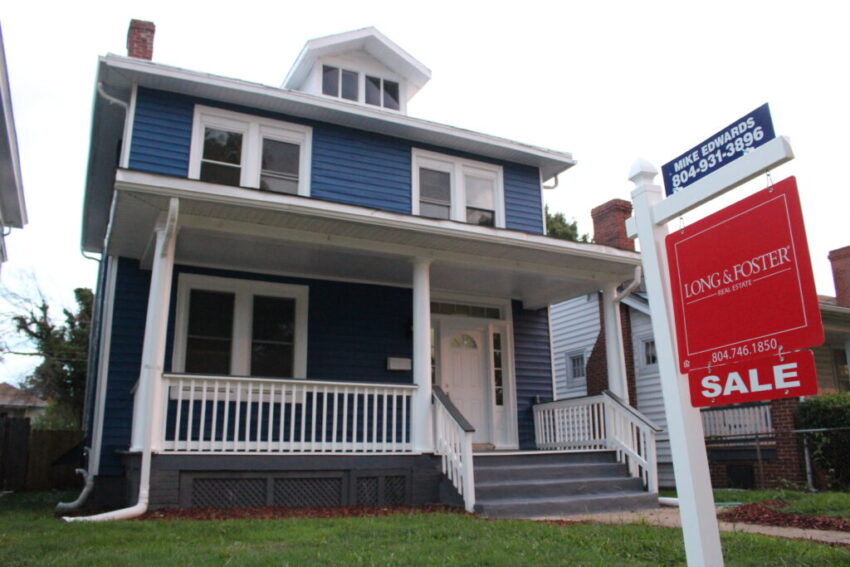A house for sale in Richmond. (Photo by Sarah Vogelsong/Virginia Mercury)
A new statewide survey finds housing one of Virginians’ top concerns — and that a strong majority want lawmakers to act on it.
Most respondents said they support policies to make it easier to build more and smaller types of homes, reduce regulatory requirements, and push local governments to streamline home construction.
Concerns over housing costs weren’t limited to urban or suburban areas. Half of rural respondents also expressed worry. Overall, 73% of those surveyed agreed that the state lacks enough affordable homes to rent or buy.
The survey was conducted online last month by YouGov for the Commonwealth Housing Coalition, a consortium of housing nonprofits and advocacy groups.
Laura Dobbs, policy director at Housing Opportunities Made Equal, said in an interview that the findings reinforce what some Virginia lawmakers have already tried to address in recent legislative sessions.
Before answering housing-specific questions, respondents were asked about their top concern. Thirty-seven percent listed housing costs, followed by inflation and healthcare.
Even among those who didn’t list housing as their top worry, 84% still agreed state lawmakers should address Virginia’s housing shortage and costs.
Survey participants also weighed in on proposals that lawmakers have previously introduced, each earning at least 65% approval and less than 25% of opposition.
Examples included laws to prevent landlords of older properties from raising rents beyond certain limits without upgrades; incentives to build apartments near business and shopping districts; allowing faith-based organizations to develop housing on their land; and efforts to encourage local governments to loosen zoning for more housing options.
Some of those efforts failed this year but are expected to return. One example is a bipartisan proposal from Sens. Saddam Salim, D-Fairfax, and Bill Stanley, R- Franklin, to encourage local zoning that permits Accessory Dwelling Units — such as carriage houses or in-law suites.
Meanwhile, the mixed-use developments in places like Libby Mill or Short Pump in Henrico County are the kind of model that Sen. Schuyler VanValkenburg, D-Henrico,wanted to replicate statewide in a failed bill. His proposal would have required localities to adopt by-right zoning for multifamily housing near commercial districts.
Likewise, a proposal from Del. Dan Helmer, D-Fairfax, would have given the state authority to intervene when local governments fail to act on affordable housing. VanValkenburg also had a version, but Helmer’s passed the House of Delegates before falling in the Senate.
“We’ve been relying on localities to do this for long enough, and they just aren’t going far enough or not keeping up with the demand,” Dobbs said.
She added that buy-in from survey respondents shows appetite for statewide action.
Because Virginia is a Dillon Rule state, local governments only have the powers the state grants them. While that division of authority allows local tailoring of laws, it also creates tension.
At the time, VanValkenburg described his bill as a “give and take” between preserving local control and addressing a statewide housing shortage.
Glenn Sturtevant, R-Chesterfield had cautioned it would be an “erosion” of local authority.
Despite being at odds over that bill, both men had legislation this year to block large investment firms from buying properties in Virginia. Those bills failed this year, but Sturtevant discussed the issue with the Virginia Housing Commission this week.
The goal is to prevent hedge funds and other large firms from out-bidding first-time homebuyers. He also noted how they purchase mobile home parks, which often leads to resident displacement.
“This is only going after the biggest of the big entities,” Sturtevant told the commission Tuesday. “This totally protects your mom and pop landlords and small businesses.”
Similar proposals have surfaced in Congress and other states, but Sturtevant wants Virginia to pursue its own version.
He acknowledged the idea isn’t a “silver bullet” for the housing crisis but said it could address a troubling trend. Axios reported earlier this year that 20% of Richmond’s apartments are owned by private equity firms. Some of his Chesterfield constituents, he added, have struggled to buy their first home.
“The last time Wall Street was using the housing market like a stock portfolio, we had the 2008 housing crisis,” he said. “Homes are for people.”
Dobbs noted that even when such firms do rent out properties, tenants often find it harder to resolve maintenance issues.
She emphasized that first-time buyers, including clients at HOME of Virginia, can’t compete with firms that can “drop cash” offers or skip inspections, adding that she’s “on board with Sturtevant that we should really do something about it.”
The housing commission, on which Dobbs serves, raised questions about how such a bill would be enforced and suggested tweaking it ahead of the 2026 legislative session.
Another area state lawmakers may consider for addressing housing supply and affordability is boosting the Virginia Housing Trust Fund.
An analysis by the Virginia Housing Alliance, presented to the Housing Commission, highlighted that the fund has helped create more than 19,000 affordable units across the state and invested $66 million in homeless reduction grants.
VHA Policy Director Isabel McLain noted that while Virginia is not among the states with the lowest level of investments in such funds, “we are definitely not leading the pack.”
GET THE MORNING HEADLINES.
Click this link for the original source of this article.
Author: Charlotte Rene Woods
This content is courtesy of, and owned and copyrighted by, https://www.virginiamercury.com and its author. This content is made available by use of the public RSS feed offered by the host site and is used for educational purposes only. If you are the author or represent the host site and would like this content removed now and in the future, please contact USSANews.com using the email address in the Contact page found in the website menu.





